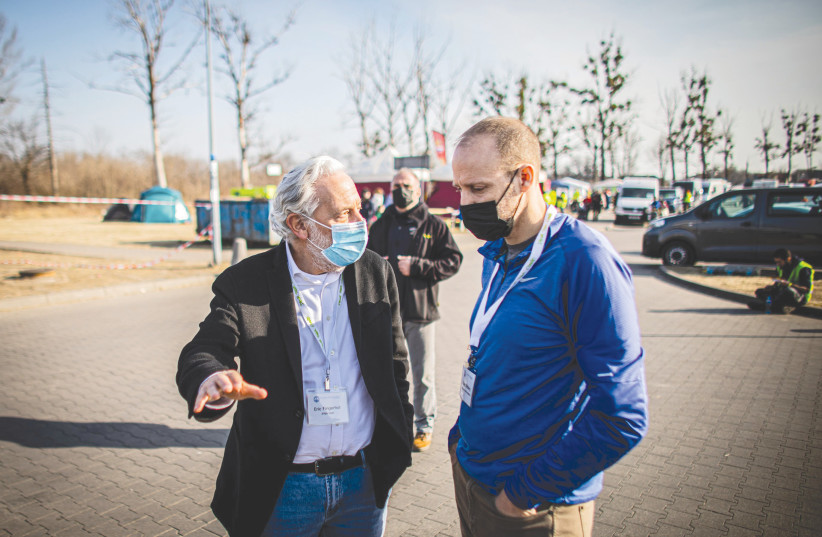On Sunday, the Jewish community in Colleyville, Texas will mark one year since a gunman stormed into the local Congregation Beth Israel during a Shabbat service taking congregants hostage. After an 11-hour standoff, an FBI hostage rescue team was able to enter the synagogue to free the hostages held by 44-year-old Malik Faisal Akram.
Rabbi Charlie Cytron-Walker, the spiritual leader of the synagogue, and three others had been held at gunpoint through the day – when the armed man entered the sanctuary and threatened to kill everyone.
The service was being live-streamed on Zoom and the gunman could be heard rambling about how he did not plan to leave the synagogue alive. “If anyone tries to enter this building, I’m telling you… everyone will die,” he was heard saying. “I’m going to die. Don’t cry about me,” the man repeated over and over.
One hostage was released unharmed six hours later. The hostage-taker was pronounced dead after security forces entered the synagogue.
Upgrading security measures
A year later, as many communities across the US are witnessing a spike in antisemitism, Jewish organizations are working to upgrade and enhance security measures.

Eric Fingerhut, CEO of the Jewish Federations of North America (JFNA) said that there’s no question that the community is safer a year after Colleyville, “but more importantly, the community will be much safer because it takes time to build security programs, and the pace of the building has accelerated dramatically since Colleyville.
“I think that the lesson was that it can happen anywhere because it was almost so random that you could imagine it happening anywhere,” he said. “And also that security training and security measures make a difference, which it clearly did, in Rabbi Cytron-Walker and his colleagues. I think when people saw both of those things, they were inspired to move even faster down the path that we’ve been on.”
He spoke about how the past year saw an increase in work on security programs, including 24 Jewish communities with newly approved or enhanced security plans. “We think by next summer we’ll be 50% covered across the country.
“This is a huge amount of work. This isn’t something you just snap your fingers and it happens. This is something that requires planning and organization, fundraising and training and hiring. We also successfully advocated to Congress and the administration to increase, yet again, the nonprofit security grant program – this time it was increased to $305 million.”
He said that out of that $305 million amount, a hundred million dollars each year would be spent on the Jewish community for the physical security components. “So yes, there’s been a dramatic acceleration in the last year,” said Fingerhut.
Increased antisemitism
“There’s just no question that you’ve seen an increase in antisemitism,” he continued. “There is a deep commitment on the part of our Jewish communities to build – put in place the security [measures] that will keep people safe so that they can participate in Jewish life without any fear of their safety. There is a serious plan that is being implemented, and we are going to make this community safe.”
Oren Baratz, senior vice president of external affairs at the Jewish Federation of Cleveland and senior advisor of LiveSecure at the JFNA, said that the threat picture hadn’t begun to deteriorate a year ago. “We have seen a long process of the security environment becoming more and more complicated. We are seeing an increase in all kinds of threats.”
In Cleveland, he said, “we have our own guard force, over 50 guards that are providing security for the whole community: schools, synagogues, agencies, events – all retired policemen.
“We have mobile patrol units [that] patrol the community all the time, in addition to the guards that are stationed in facilities. The community is covered by over a thousand cameras, license plate readers. We have our own dispatchers that sit within the security dispatch integrated with local law enforcement,” said Baratz.
In order to increase the security of the Jewish community, he said, “the security responsibility is not only of the security personnel – the more community members will understand that they have to be aware and they have to report immediately – I prefer over-reporting then not reporting. In addition, security shouldn’t be a main issue only after Colleyville or Pittsburgh."
“One of the things we see is that after [major attacks], for a week, people are good about closing doors and stuff like that,” he continued. “A week afterward, we go back to our steady state where people leave doors open intentionally in order to be comfortable. From a security point of view, it is so frustrating.”
